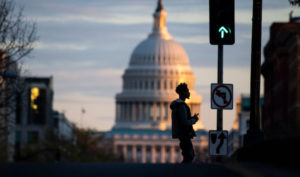Enforcing Net-Zero Goals
Scholar calls for greater oversight and enforcement of corporate net-zero carbon emissions pledges.
Rapid Responses to Major Questions
Scholar proposes a new fast-track legislative procedure to affirm agency regulatory authority.
How to Delegate Authority for Climate Action
Scholar advocates the use of foreign policy authority for executive branch climate action.
DNA Testing is Not “Just Saliva”
To protect consumers, governments should step in to address the risks of DNA testing.
Regulating the Metaverse
In this week’s Saturday Seminar, experts propose methods for regulating the metaverse.
The Inequality of Fintech
Scholars argue that regulators should act now to prevent fintech from exacerbating wealth inequality.
The Consequences of a Subminimum Wage
Debate ensues over the consequences of eliminating an exemption to the federal minimum wage for tipped employees.
Outcome-Based Cooperative Regulation
The key to improving regulation rests with strengthening its capacity to reinforce productive cooperation.
U.K. Proposes Major Financial Regulation Overhaul
A proposed reform package to boost U.K. financial sector competitiveness faces critique.
The Adjudicatory Capacity to Make Decisions
Scholar suggests that increasing the number of support staff would improve the accuracy of administrative adjudication.
Rethinking FERC’s Approach to Natural Gas Pipeline Approvals
Scholar urges FERC to consider clean energy policies before approving natural gas pipelines.
What is the Future of Regulatory Policy?
The OECD’s latest Regulatory Policy Outlook is the most forward-looking yet.












